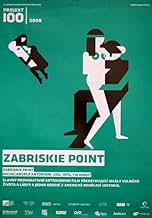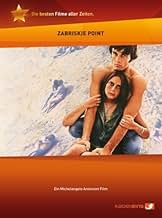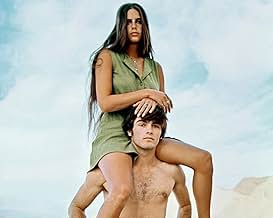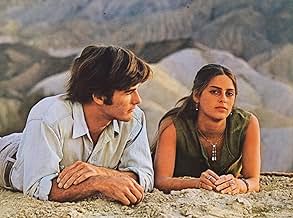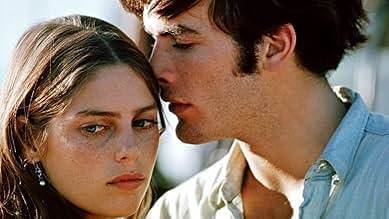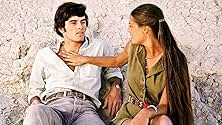AVALIAÇÃO DA IMDb
6,9/10
18 mil
SUA AVALIAÇÃO
Numa época de agitação civil crónica no final dos anos 60, a América.Numa época de agitação civil crónica no final dos anos 60, a América.Numa época de agitação civil crónica no final dos anos 60, a América.
- Direção
- Roteiristas
- Artistas
- Prêmios
- 1 vitória e 1 indicação no total
Martin Abrahams
- Radical student
- (não creditado)
Michael L. Davis
- Police lieutenant on loudspeaker
- (não creditado)
Lee Duncan
- Highway patrolman
- (não creditado)
George Dunn
- Airport mechanic
- (não creditado)
Dennis Falt
- University student
- (não creditado)
Harrison Ford
- Arrested student
- (não creditado)
Jim Goldrup
- College student
- (não creditado)
Norman Grabowski
- Man in Deli
- (não creditado)
Bill Hickman
- Gun store owner
- (não creditado)
- …
Kenner G. Kemp
- Departing Plane Passenger
- (não creditado)
Peter Lake
- Documentary cameraman
- (não creditado)
Avaliações em destaque
These are the late 60's and the early 70's as I have always imagined. As usual Antonioni uses all the registers of communications: the sounds, the colours, the movements of the actors. You could say that the plot is not well balanced, that the dialogues are often silly and meaningless, and maybe you are right. But Antonioni is a master in evoking feelings, simple, rough feelings, using all the tools a filmmaker has.
The movie has some jewels, and among them the most shining are the 10 final minutes. The oneiric explosion sequence, with the music that comes and goes, with the time expanded and slowed down, with the kitsch colours of meaningless objects moving upward in the blue sky. In the movie history this is one of the best images of the explosive and destructive power of the ingenuity of that generation, that wanted to live changing the existing rules. Playing with colour, time, sounds and music Antonioni has given once more a proof of his unforgettable art: he is at the same time a painter, a music composer, a dancer, a poet.
The movie has some jewels, and among them the most shining are the 10 final minutes. The oneiric explosion sequence, with the music that comes and goes, with the time expanded and slowed down, with the kitsch colours of meaningless objects moving upward in the blue sky. In the movie history this is one of the best images of the explosive and destructive power of the ingenuity of that generation, that wanted to live changing the existing rules. Playing with colour, time, sounds and music Antonioni has given once more a proof of his unforgettable art: he is at the same time a painter, a music composer, a dancer, a poet.
I was told it was one of those "either you love it or you hate it" movies. Well, I loved it. Obvious hippie-era, dated and easy symbolism and all. So, I probably have no taste at all when it comes to Antonioni, but this and La Notte (made exactly a decade earlier) are my favourites among his movies so far. Made two years before I was born, Zabriskie Point was supposed to have been Michelangelo's great American epic. But apparently, it turned out to be a flop. I really can't see why. Before watching it I'd read that it was rather boring, so I braced myself for a very slow movie - though I love me a slow movie. For my taste, Zabriskie didn't have a tedious minute in it. While watching it, I made a mental note of how European it was on the director's part to make such frequent use of advertisement billboards in almost every urban scene, enormous billboards dwarfing any human form in sight. This recurrent visual element is obviously there to underline the way that consumerism crushes the individual in American society. But then I watched L'Eclisse straight afterwards, which is set in Rome in the early 60s, and noticed that Antonioni often included billboards in it as well. After all, the masterful use of landscapes, architecture and inanimate objects in each frame with or without human beings is an Antonioni trademark this is precisely the way that he evokes his characters' psychological states, with more or less understated power and great visual impact. He is virtually unsurpassed in this skill.
Zabriskie Point starred two very appealing leads that should have become big stars of the 70s, but never did. Mark Frechette, whom I'd already seen in Francesco Rosi's fine WWI-set movie Uomini Contro, had a very tragic life and died aged just 27. According to his biography page, he donated his $60,000 earnings from Zabriskie to a commune. Mark's co-star Daria Halprin, apparently also Dennis Hopper's wife later on, has the stunning, natural beauty and appeal of a young Ornella Muti one of those luminous beauties that don't need a shred of make-up to turn heads. Like Frechette, she has only graced a couple of obscure movies and has never become a star, but at least she didn't die tragically. Most notably, Zabriskie Point contains one of the most original sex scenes ever filmed - one that brings home a sense of youthful playfulness like few I've seen - as well as a powerfully cathartic ending. It may be the most banal sequence ever filmed as far as its symbolism goes, but I can't see how anyone can deny its beauty and wonderful sense of emotional release. Never has an explosion looked so good, and so poetic. It seems to be an explosion that restores order rather than bringing chaos.
Zabriskie Point starred two very appealing leads that should have become big stars of the 70s, but never did. Mark Frechette, whom I'd already seen in Francesco Rosi's fine WWI-set movie Uomini Contro, had a very tragic life and died aged just 27. According to his biography page, he donated his $60,000 earnings from Zabriskie to a commune. Mark's co-star Daria Halprin, apparently also Dennis Hopper's wife later on, has the stunning, natural beauty and appeal of a young Ornella Muti one of those luminous beauties that don't need a shred of make-up to turn heads. Like Frechette, she has only graced a couple of obscure movies and has never become a star, but at least she didn't die tragically. Most notably, Zabriskie Point contains one of the most original sex scenes ever filmed - one that brings home a sense of youthful playfulness like few I've seen - as well as a powerfully cathartic ending. It may be the most banal sequence ever filmed as far as its symbolism goes, but I can't see how anyone can deny its beauty and wonderful sense of emotional release. Never has an explosion looked so good, and so poetic. It seems to be an explosion that restores order rather than bringing chaos.
Antonioni, by making this film, had assumed the role of Papa Smurf to all the little long-haired, American, radical student-Smurfs. He had taken them under the guiding protection of his European communist wings, showing appreciation and support for their confused American ways. (These Smurfs are red and wear blue, not the other way around.) The radical Smurfs were happy to get the guidance of a wise old man with gray hair who regularly preys to the God of all long-haired Smurfs, Lenin the Communist - another wise old man whose beard made the Smurfs take him even more seriously, for it symbolized something wise, though they did not quite know why they regarded the beard to have this kind of deep effect on them. Castro, another wise bearded man, has often profited from this confusion and exuded magical powers with his beard over his naive overseas admirers. (Not to mention Che Guevara: that beard has a certain je-ne-sais-pas-quoi about it, makes one want to immediately embrace Marx and his lovely, pacifistic teachings
) The film starts with a muddled meeting of radically stupid radical students, who engage in dialogues that truly redefine the word "confused". As confused as a blind-folded dog falling of a high-story building into a bottomless pit. Suddenly, the movie's "hero" (well, Antonioni's hero) rises up and says something to his pathetic left-wing peers and then leaves, hoping that this display of "mega-coolness" will improve his James Dean image and vastly increase his chances of getting laid with the best "chicks" in the next mass hippie orgy. Eventually he gets into trouble with cops (i.e. pigs) at a rally, and spends the movie under the blue American capitalist skies, looking for freedom
Or something like that.
Antonioni's predictable assault on capitalism is not only intellectually hollow, but has (or had) nothing new to offer; it's just the same old trigger-happy one-dimensional cops, businessmen discussing business deals (and what's wrong with that, isn't that how Antonioni's movies get made?), and endless shots of TV commercials and billboards advertising the oh-so morally decadent products for the abhorrent, selfish, and greedy right-wing rabble-population who thinks of no one but themselves, their families, their work, and their children.
Papa Smurf Antonioni, just like his long-haired Smurfs and Smurfettes of the late 60s, failed to notice the most obvious and vital aspect about their silly movement: they were allowed to have their laughable meetings and express their anti-establishment opinions freely within that very establishment, whereas the students in those countries whose left-wing systems they admired, did not (and still do not). By far the greatest irony about the hippies - and Antonioni, naturally, failed to realize this as well (his judgment being clouded by cocaine-snorting and an excessive intake of LSD) - is that hippies were (are) the garbage-residue of capitalism. This is an incredible irony. Only in a successfully-functioning capitalist system can you find that species called "hippie"; a spoiled, ungrateful, and selfish bunch of middle and upper-middle class losers.
The film itself seems to go on forever. Antonioni takes his sweet time with getting on with it, while including overlong scenes of pointlessness, with a high dullness factor. His attempts at symbolism are annoying and trite. His statements are highly dubious, at best. This film is Antonioni's way of saying that violent revolution is the solution. And this is what we get from an old, saturated, filthy-rich, fat film-maker who lives in villas and dines in the best French and Italian restaurants.
I don't remember seeing any major Western movie about the Tiananmen massacre of thousands of students in China. But when one Western student gets shot for waving Che Guevara's face into all our faces, we get ten major films about it at once. I suppose this means that a Chinese life is worth a thousand times less than a Western one at least to the left-wing hypocrites who infest movies.
If you're a Marxist neo-hippy and disliked this awful review, please klick "NO" below.
Antonioni's predictable assault on capitalism is not only intellectually hollow, but has (or had) nothing new to offer; it's just the same old trigger-happy one-dimensional cops, businessmen discussing business deals (and what's wrong with that, isn't that how Antonioni's movies get made?), and endless shots of TV commercials and billboards advertising the oh-so morally decadent products for the abhorrent, selfish, and greedy right-wing rabble-population who thinks of no one but themselves, their families, their work, and their children.
Papa Smurf Antonioni, just like his long-haired Smurfs and Smurfettes of the late 60s, failed to notice the most obvious and vital aspect about their silly movement: they were allowed to have their laughable meetings and express their anti-establishment opinions freely within that very establishment, whereas the students in those countries whose left-wing systems they admired, did not (and still do not). By far the greatest irony about the hippies - and Antonioni, naturally, failed to realize this as well (his judgment being clouded by cocaine-snorting and an excessive intake of LSD) - is that hippies were (are) the garbage-residue of capitalism. This is an incredible irony. Only in a successfully-functioning capitalist system can you find that species called "hippie"; a spoiled, ungrateful, and selfish bunch of middle and upper-middle class losers.
The film itself seems to go on forever. Antonioni takes his sweet time with getting on with it, while including overlong scenes of pointlessness, with a high dullness factor. His attempts at symbolism are annoying and trite. His statements are highly dubious, at best. This film is Antonioni's way of saying that violent revolution is the solution. And this is what we get from an old, saturated, filthy-rich, fat film-maker who lives in villas and dines in the best French and Italian restaurants.
I don't remember seeing any major Western movie about the Tiananmen massacre of thousands of students in China. But when one Western student gets shot for waving Che Guevara's face into all our faces, we get ten major films about it at once. I suppose this means that a Chinese life is worth a thousand times less than a Western one at least to the left-wing hypocrites who infest movies.
If you're a Marxist neo-hippy and disliked this awful review, please klick "NO" below.
At the time of its release, ZABRISKE POINT caused great division in film-going circles. A "wannabe classic but artless piece of empty canvas" was the view of the establishment, most critics included. To the alternative movement...a "revelation of everything that is wrong in the world today (1970)" Not too much has changed judging by the comments here, although an overall user-rating of an almost respectable 6.2 suggests an increase in the appreciation factor.
Poor old Mark Frechette and Daria Halpin as the star crossed lovers - definitely in the wrong place at the wrong time (weren't they EVERY wronged and downtrodden teenager of the period???) copped most of the flack, totally unreasonably. They were SUPPOSED to be Mr and Miss typical troubled youth, not Rhett Butler and Scarlett O'Hara on a bender! This was an image-driven film and many flag waving americans were incensed that Italy's outre director Antonioni was given free rein to portray the angst of American youth.
Cinematically, the film was awesome. In London at the time, I saw it on its release and thought that from an objective viewpoint it was quite brilliant (admittedly, I was only 24 myself). Many have commented on its alleged self-indulgence. Yeah, well it WAS Antonioni's film - surely he was free to express his art-form in whatever way he saw fit at the time? The desert scenes have not been topped by any film since.
ZABRISKIE POINT may be shy of "masterpiece" status (mind you, who amongst is solely qualified to make THAT call?) but it is probably now, THE defining film of 70's culture. A time when acid trips, communal living, even just plain old fashioned "love" were not that easy a choice to live with!
Poor old Mark Frechette and Daria Halpin as the star crossed lovers - definitely in the wrong place at the wrong time (weren't they EVERY wronged and downtrodden teenager of the period???) copped most of the flack, totally unreasonably. They were SUPPOSED to be Mr and Miss typical troubled youth, not Rhett Butler and Scarlett O'Hara on a bender! This was an image-driven film and many flag waving americans were incensed that Italy's outre director Antonioni was given free rein to portray the angst of American youth.
Cinematically, the film was awesome. In London at the time, I saw it on its release and thought that from an objective viewpoint it was quite brilliant (admittedly, I was only 24 myself). Many have commented on its alleged self-indulgence. Yeah, well it WAS Antonioni's film - surely he was free to express his art-form in whatever way he saw fit at the time? The desert scenes have not been topped by any film since.
ZABRISKIE POINT may be shy of "masterpiece" status (mind you, who amongst is solely qualified to make THAT call?) but it is probably now, THE defining film of 70's culture. A time when acid trips, communal living, even just plain old fashioned "love" were not that easy a choice to live with!
There aren't too many times when I see a film and go, "huh, what?", but this was one of them. Maybe after seeing Zabriskie Point I felt much the same way Woody Allen felt after seeing 2001- he only liked the film after seeing it three times over a two year period, realizing the filmmaker was ahead of him in what was going on. Michelangelo Antonioni, in one of his few tries at making films inside of the US (after Red Desert, he did Blow-Up, this film, China, and The Passenger, all filmed outside his native Italy), I could sense he almost tried to learn about the ways of the country through his own mastery of the medium. The results show that he doesn't lack the means to present images, feelings, tones, colors, sounds, and a visual representation of this era. "A director's job is to see", Antonioni once stated. Whatever that means, he doesn't disappoint for the admirer of his post-fifties work (I say post-fifties since I've yet to see any of his films from before L'Avventura).
What he does lack is a point, at least the kind of point that he could bring in Blow-Up and The Eclipse. You get the feeling of what is around these characters, what the themes are bringing forth to their consciousness, however in this case the characters and the actors don't bring much conviction or purpose. Antonioni, coming from the school of hard-knocks, neo-realistic film-making, does do what he can with his mostly non-professional cast (those who look most like real actors are subjugated to the roles of the corporate characters), but the two stars Mark Frechette and Daria Halprin seem as if Antonioni's under-directing them. Perhaps that was the point. The story's split into three acts, thankfully not too confusing, as Mark escapes his existence around the boiling, dangerous campus life going on in the circa late 60's LA area, and Daria is sent out from LA to drive to Phoenix for some business meeting. They meet by chance as Mark's plane (how does he know how to drive, maybe a little background info there?) and Daria's car meet up, and they spend some time together in an existential kind of groove out in the desert. Aside from a stylistically mesmerizing if bizarre sex scene, much of this act isn't terribly interesting.
The two leads are fair enough to look at, but what exactly draws them to each other outside of curiosity? The ideas that come forth (in part from a screenplay co-written by Sam Shepard) aren't too revealing, except for one brief instant where drugs vs. reality is brought up. Then the film heads towards the third act, as Mark decides to do the right thing, under disastrous circumstances, and Daria arrives at her boss' place, only to be in full disillusionment (not taking into account the infamous last five minutes or so of the film). Although the film took its time telling its story, I didn't have as much of a problem with that as I did that the story only engages a certain kind of viewer. I understand and empathize with the feelings and doubts and fears as well as the self-confidence of the "anti-establishment", but maybe Antonioni isn't entirely fully aware of it himself. In some scenes he as director and editor (and the often astounding cinematography by Alfio Contini) find the scenery and backgrounds more enlightening and fixating than the people in the foreground. Not to say the technical side of Zabriskie Point isn't involving to a degree (this may make some feel drowsy, as Antonioni is probably far greater as a documentary filmmaker as he is a theatrical director like say Francis Ford Coppola is).
The deserts, skies, city, and even the faces in close-ups are filmed with the eye of a filmmaker in love with the art of getting things in the frame, bringing us in. The soundtrack is equally compelling, with a master stroke including a sweet Rolling Stones song at one point, and then a crushing, surreal Pink Floyd song (re-titled from 'Careful with that Axe Eugene, one of their best pre-Dark Side) in the explosion sequence. If only the performances weren't so one-sided I might find this to be on par with Blow-Up or The Eclipse. It's an unconventional stroke of genius on one hand, and on the other a boring take on what was the hippie/radical movement of the late 60's. But hey, what may be boring for an American such as myself born in the eighties may not be to others outside the US, such as say, Italy. And it does ask to not be discarded right away after one viewing.
What he does lack is a point, at least the kind of point that he could bring in Blow-Up and The Eclipse. You get the feeling of what is around these characters, what the themes are bringing forth to their consciousness, however in this case the characters and the actors don't bring much conviction or purpose. Antonioni, coming from the school of hard-knocks, neo-realistic film-making, does do what he can with his mostly non-professional cast (those who look most like real actors are subjugated to the roles of the corporate characters), but the two stars Mark Frechette and Daria Halprin seem as if Antonioni's under-directing them. Perhaps that was the point. The story's split into three acts, thankfully not too confusing, as Mark escapes his existence around the boiling, dangerous campus life going on in the circa late 60's LA area, and Daria is sent out from LA to drive to Phoenix for some business meeting. They meet by chance as Mark's plane (how does he know how to drive, maybe a little background info there?) and Daria's car meet up, and they spend some time together in an existential kind of groove out in the desert. Aside from a stylistically mesmerizing if bizarre sex scene, much of this act isn't terribly interesting.
The two leads are fair enough to look at, but what exactly draws them to each other outside of curiosity? The ideas that come forth (in part from a screenplay co-written by Sam Shepard) aren't too revealing, except for one brief instant where drugs vs. reality is brought up. Then the film heads towards the third act, as Mark decides to do the right thing, under disastrous circumstances, and Daria arrives at her boss' place, only to be in full disillusionment (not taking into account the infamous last five minutes or so of the film). Although the film took its time telling its story, I didn't have as much of a problem with that as I did that the story only engages a certain kind of viewer. I understand and empathize with the feelings and doubts and fears as well as the self-confidence of the "anti-establishment", but maybe Antonioni isn't entirely fully aware of it himself. In some scenes he as director and editor (and the often astounding cinematography by Alfio Contini) find the scenery and backgrounds more enlightening and fixating than the people in the foreground. Not to say the technical side of Zabriskie Point isn't involving to a degree (this may make some feel drowsy, as Antonioni is probably far greater as a documentary filmmaker as he is a theatrical director like say Francis Ford Coppola is).
The deserts, skies, city, and even the faces in close-ups are filmed with the eye of a filmmaker in love with the art of getting things in the frame, bringing us in. The soundtrack is equally compelling, with a master stroke including a sweet Rolling Stones song at one point, and then a crushing, surreal Pink Floyd song (re-titled from 'Careful with that Axe Eugene, one of their best pre-Dark Side) in the explosion sequence. If only the performances weren't so one-sided I might find this to be on par with Blow-Up or The Eclipse. It's an unconventional stroke of genius on one hand, and on the other a boring take on what was the hippie/radical movement of the late 60's. But hey, what may be boring for an American such as myself born in the eighties may not be to others outside the US, such as say, Italy. And it does ask to not be discarded right away after one viewing.
Você sabia?
- CuriosidadesAntonioni met with Jim Morrison during early production to ask for a musical contribution to the soundtrack. Morrison and the Doors provided "L'America" which Antonioni then rejected.
- Erros de gravaçãoZabriskie Point, in Death Valley National Park (California, USA) is not actually the lowest-elevation point in the United States. That would be Badwater Basin, at a depth of 282 feet below sea level, which is also located in Death Valley National Park about 20 miles away.
- Citações
[booking a protester]
Cop: Occupation?
William S. Polit, protester: Associate professor of history.
Cop: That's too long, Bill. I'll just put down clerk.
- Versões alternativasIn the original version, the song that's playing when Daria drives away at the very end and over the closing "End" title card is a Roy Orbison song, but in the 1984 MGM/UA Home Video version it's a continuation of the Pink Floyd song. The 1991 MGM/UA Home Video version restores the Orbison song.
- ConexõesEdited into Histoire(s) du cinéma: La monnaie de l'absolu (1999)
Principais escolhas
Faça login para avaliar e ver a lista de recomendações personalizadas
- How long is Zabriskie Point?Fornecido pela Alexa
Detalhes
Bilheteria
- Orçamento
- US$ 7.000.000 (estimativa)
- Faturamento bruto mundial
- US$ 84.879
- Tempo de duração1 hora 53 minutos
- Mixagem de som
- Proporção
- 2.35 : 1
Contribua para esta página
Sugerir uma alteração ou adicionar conteúdo ausente



